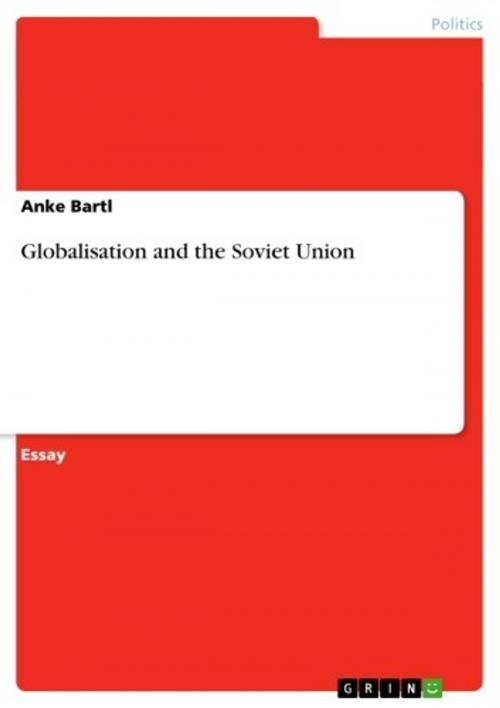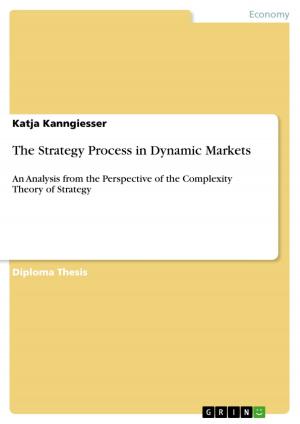| Author: | Anke Bartl | ISBN: | 9783638222013 |
| Publisher: | GRIN Publishing | Publication: | October 8, 2003 |
| Imprint: | GRIN Publishing | Language: | English |
| Author: | Anke Bartl |
| ISBN: | 9783638222013 |
| Publisher: | GRIN Publishing |
| Publication: | October 8, 2003 |
| Imprint: | GRIN Publishing |
| Language: | English |
Essay from the year 2003 in the subject Politics - International Politics - Region: Russia, grade: High Distinction, Flinders University (Social Sciences), course: Introduction to Globalisation, 23 entries in the bibliography, language: English, abstract: This essay aims at explaining the impacts of the processes globalisation on the fall of the Soviet Union and the problems this created for the new Russia in transition. First of all it is necessary to look at some parts of the history of the Soviet Union and the nature of Communism before moving on to defining globalisation and its effects on Russia and the Commonwealth of Independent States (CIS). Why is it so important to deal with history first? It is because the former Soviet Union economically and ideologically had shut itself off to most parts of the globe for decades and hence the effects of globalisation must be reflected under the light of these specific circumstances. In short, the Bolshevik uprising in 1917 was successful and brought the Bolshevik Party into power which was renamed Communist Party in 1918. In the years from 1918 to 1921 a civil war followed in which the Bolshevik regime was almost overthrown but managed to stay in power, taking control over the economy and turning it into a war economy. After 1918 the Soviet Union experienced three years of war communism. Under the wing of Socialism the economy was organised in a military sense and forced the whole nation to put their labour into keeping up a traditional army and securing military power.1 In 1921 Lenin introduced The New Economic Policy as he realised that war communism was a failure and that it had led to peasant revolts endangering the Soviet State. The idea now was to maintain industry under state control and to allow a market for agriculture, trade and commerce.2 This system made it possible for peasants and rural capitalists to gain relative wealth whereas the urban population experienced increasing unemployment. By the late 1920s this emerging rural capitalism was regarded as a threat to the system and lead to a very fragile relationship between the Communist government and the rural population. In order to avoid the collapse of Communist Soviet Union, Stalin implemented mass collectivisation of agriculture and rapid industrialisation.3 [...] 1 David Christian, Imperial and Soviet Russia: Power, Privilege and the Challenge of Modernity, Macmillan Press, Houndsmills, 1997, pp.207 - 231. 2 David Lockwood, The Destruction of the Soviet Union, Macmillan Press, Houndsmills, 2000, p.66. 3 David Christian, Imperial and Soviet Russia: Power, Privilege and the Challenge of Modernity, Macmillan Press, Houndsmills, 1997, pp. 262 & 265.
Essay from the year 2003 in the subject Politics - International Politics - Region: Russia, grade: High Distinction, Flinders University (Social Sciences), course: Introduction to Globalisation, 23 entries in the bibliography, language: English, abstract: This essay aims at explaining the impacts of the processes globalisation on the fall of the Soviet Union and the problems this created for the new Russia in transition. First of all it is necessary to look at some parts of the history of the Soviet Union and the nature of Communism before moving on to defining globalisation and its effects on Russia and the Commonwealth of Independent States (CIS). Why is it so important to deal with history first? It is because the former Soviet Union economically and ideologically had shut itself off to most parts of the globe for decades and hence the effects of globalisation must be reflected under the light of these specific circumstances. In short, the Bolshevik uprising in 1917 was successful and brought the Bolshevik Party into power which was renamed Communist Party in 1918. In the years from 1918 to 1921 a civil war followed in which the Bolshevik regime was almost overthrown but managed to stay in power, taking control over the economy and turning it into a war economy. After 1918 the Soviet Union experienced three years of war communism. Under the wing of Socialism the economy was organised in a military sense and forced the whole nation to put their labour into keeping up a traditional army and securing military power.1 In 1921 Lenin introduced The New Economic Policy as he realised that war communism was a failure and that it had led to peasant revolts endangering the Soviet State. The idea now was to maintain industry under state control and to allow a market for agriculture, trade and commerce.2 This system made it possible for peasants and rural capitalists to gain relative wealth whereas the urban population experienced increasing unemployment. By the late 1920s this emerging rural capitalism was regarded as a threat to the system and lead to a very fragile relationship between the Communist government and the rural population. In order to avoid the collapse of Communist Soviet Union, Stalin implemented mass collectivisation of agriculture and rapid industrialisation.3 [...] 1 David Christian, Imperial and Soviet Russia: Power, Privilege and the Challenge of Modernity, Macmillan Press, Houndsmills, 1997, pp.207 - 231. 2 David Lockwood, The Destruction of the Soviet Union, Macmillan Press, Houndsmills, 2000, p.66. 3 David Christian, Imperial and Soviet Russia: Power, Privilege and the Challenge of Modernity, Macmillan Press, Houndsmills, 1997, pp. 262 & 265.















